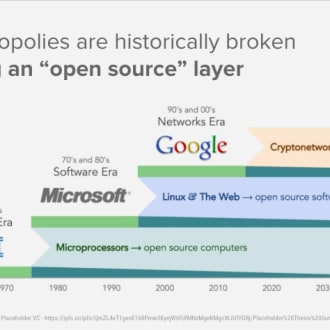
9 Best Articles on Decentralization
The most useful articles on decentralization from around the web, curated by thought leaders and our community.
Refind focuses on timeless pieces and updates the list whenever new, must-read articles or videos are discovered.
Top 5 Decentralization Articles
At a glance: these are the articles that have been most read, shared, and saved on decentralization by Refind users in 2024 so far.
Short Articles
Short on time? Check out these useful short articles on decentralization—all under 10 minutes.
Centralization vs Decentralization
Decentralization is one of, if not the most, discussed features of the crypto tech stack. In a decentralized system, no single body controls the system. We have most certainly not reached the era…
Why Decentralization Matters
Centralized platforms have been dominant for so long that many people have forgotten there is a better way to build internet services.
What to do once you admit that decentralizing everything never seems to work
Lots of tech projects these days, especially crypto-networks, aspire to decentralization. Or their evangelists say they do, because they…
Decentralization in Bitcoin and Ethereum
We have been examining the state of the Bitcoin and Ethereum networks over time. In a recent study, we examine the level of decentralization in these two networks, with some interesting takeaways for…
Long Articles
These are some of the most-read long-form articles on decentralization.
Why it's too early to get excited about Web3
There’s been a lot of talk about Web3 lately, and as the person who defined “Web 2.0” 17 years ago, I’m often asked to comment. I’ve generally avoided doing so because most prognostications about the…
Decentralization for Web3 Builders: Principles, Models, How
To guide web3 builders tackling what decentralization means in practice, across several use cases, we cover: the design challenge of web3 decentralization; how builders can use the novel components of…
«“Don’t be evil” is very different than “can’t be evil” when a CEO decides one course or another.»
Decentralisation: the next big step for the world wide web
The decentralised web, or DWeb, could be a chance to take control of our data back from the big tech firms. So how does it work and when will it be here?
“I Was Devastated”: The Man Who Created the World Wide Web Has Some Regrets
Tim Berners-Lee has seen his creation debased by everything from fake news to mass surveillance. But he’s got a plan to fix it.
Why Everyone Missed the Most Mind-Blowing Feature of Cryptocurrency
There’s one incredible feature of cryptocurrencies that almost everyone seems to have missed, including Satoshi himself.
What is Refind?
Every day Refind picks the most relevant links from around the web for you. Picking only a handful of links means focusing on what’s relevant and useful.
How does Refind curate?
It’s a mix of human and algorithmic curation, following a number of steps:
- We monitor 10k+ sources and 1k+ thought leaders on hundreds of topics—publications, blogs, news sites, newsletters, Substack, Medium, Twitter, etc.
- In addition, our users save links from around the web using our Save buttons and our extensions.
- Our algorithm processes 100k+ new links every day and uses external signals to find the most relevant ones, focusing on timeless pieces.
- Our community of active users gets the most relevant links every day, tailored to their interests. They provide feedback via implicit and explicit signals: open, read, listen, share, mark as read, read later, «More/less like this», etc.
- Our algorithm uses these internal signals to refine the selection.
- In addition, we have expert curators who manually curate niche topics.
The result: lists of the best and most useful articles on hundreds of topics.
How does Refind detect «timeless» pieces?
We focus on pieces with long shelf-lives—not news. We determine «timelessness» via a number of metrics, for example, the consumption pattern of links over time.
How many sources does Refind monitor?
We monitor 10k+ content sources on hundreds of topics—publications, blogs, news sites, newsletters, Substack, Medium, Twitter, etc.
Can I submit a link?
Indirectly, by using Refind and saving links from outside (e.g., via our extensions).
How can I report a problem?
When you’re logged-in, you can flag any link via the «More» (...) menu. You can also report problems via email to hello@refind.com
Who uses Refind?
450k+ smart people start their day with Refind. To learn something new. To get inspired. To move forward. Our apps have a 4.9/5 rating.
Is Refind free?
Yes, it’s free!
How can I sign up?
Head over to our homepage and sign up by email or with your Twitter or Google account.
Keep Learning
Get the big picture on your favorite topics.








